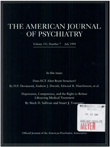Recovery and relapse from major depressive disorder in the elderly
Abstract
OBJECTIVE: Results from the National Institute of Mental Health (NIMH) Collaborative Study of the Psychobiology of Depression raised serious concerns about the longer-term prognosis for major depressive disorder in younger persons. However, little research has examined the prognosis for major depressive disorder in the elderly despite suggestions that they have poorer clinical outcomes than younger adults. The objective of this study was to 1) document rates of recovery and relapse from major depressive disorder in a large group of inpatient elderly and 2) compare recovery and relapse rates from major depressive disorder in the elderly with those in a mixed-age patient group from the NIMH collaborative study. METHOD: The psychiatric status of 127 elderly inpatients diagnosed with major depressive disorder by Research Diagnostic Criteria was evaluated for 1 year. The same diagnostic and follow-up method to assess psychiatric symptoms employed in the NIMH study were used. RESULTS: One year after study admission, 72% of elderly patients had recovered. Nineteen percent of recovered patients, however, had a subsequent episode of major depressive disorder. Recovery and relapse rates in the elderly did not significantly differ from those reported for the mixed-age group in the NIMH study. CONCLUSIONS: It is erroneous to single out the elderly as being more likely to have poorer longitudinal treatment outcomes than others. Study findings indicate the need for continued refinement of somatic and nonsomatic treatments for the elderly to improve rates of sustained recovery from depression.
Access content
To read the fulltext, please use one of the options below to sign in or purchase access.- Personal login
- Institutional Login
- Sign in via OpenAthens
- Register for access
-
Please login/register if you wish to pair your device and check access availability.
Not a subscriber?
PsychiatryOnline subscription options offer access to the DSM-5 library, books, journals, CME, and patient resources. This all-in-one virtual library provides psychiatrists and mental health professionals with key resources for diagnosis, treatment, research, and professional development.
Need more help? PsychiatryOnline Customer Service may be reached by emailing [email protected] or by calling 800-368-5777 (in the U.S.) or 703-907-7322 (outside the U.S.).



